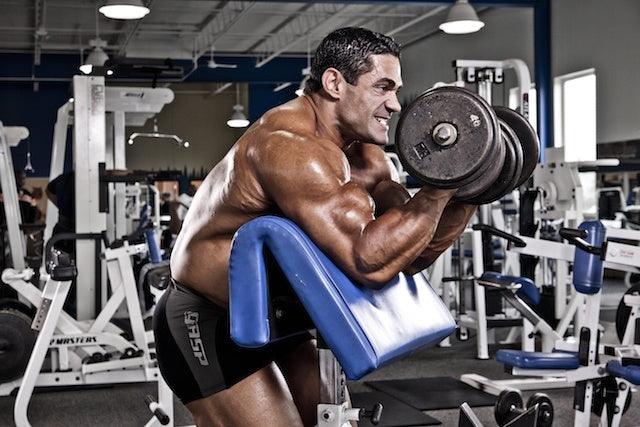

Speed Kills! Lifting too Fast May Not Be Optimal for Muscle Gains
Table of Contents

Speed Kills! Lifting too Fast May Not Be Optimal for Muscle Gains
Ask Gustavo: How Fast Should I Lift?
Question: Gustavo, how fast should I be lifting and lowering the weight when I train?
Answer: You should always lift with a slow and controlled speed. I see way to many guys in the gym bouncing the barbell off his chest and swinging their arms when doing curls because they are using to much weight. Many guys in the gym lift with very little control and instead of performing the lift with a slow controlled manner, they lift very fast. When I train, I use an explosive concentric phase (i.e. lifting the weight up) followed by a slow eccentric phase (lowering the weight). When I was younger, I let my ego get in the way and I tried to lift heavy, but I found that I grew faster when I used more control. Researchers from Brazil reported that lowering the weight slowly instead of fast can result in a greater Growth Hormone (GH) burst during exercise.
 GH can be increased by high-intensity exercise that increases blood lactate levels, also rest intervals between sets, volume lifted, intensity and the velocity or speed of movements. Researchers wanted to examine the GH responses when men bench press with a weight that was lowered slowly and the when the weight was lowered rapidly. GH can be increased by high-intensity exercise that increases blood lactate levels, also rest intervals between sets, volume lifted, intensity and the velocity or speed of movements. Researchers wanted to examine the GH responses when men bench press with a weight that was lowered slowly and the when the weight was lowered rapidly. |
-The men in one group took half a second to lower the weight: fast lowering
-the men in the other group took three seconds to lower the weight [slow, controlled eccentric.
The experimental protocol consisted of only the eccentric phase of movement in the bench press exercise (free weight), which was performed with four sets of eight repetitions at 70% of 1RM and 2-minute rest intervals between sets.

The results were quite shocking, the slow eccentric lowering bench press group (i.e. 3 seconds to lower the weight) resulted in a greater metabolic stress to perform the exercise, resulting in increased 17 times greater GH secretion after an eccentric exercise bout (~ 1700% higher). The slow lowering eccentric group also had greater blood lactate responses compared to the fast lowering group. These results demonstrate the influence of eccentric lowering speed on metabolic stress and acute hormonal responses. What’s interesting is that we have two identical groups performing the same weight yet the GH responses were much lower in the fast eccentric lowering group.
In conclusion, slow, controlled eccentric muscle actions influence acute responses GH responses after bench press exercise performed by resistance-trained men, resulting in a greater metabolic stress and hormone response. These results suggest that slow eccentric bench press exercise prescribed by a specific muscular strength test is an effective way to induce a significantly greater GH release.
Calixto R, Verlengia R, Crisp A, et al. ACUTE EFFECTS OF MOVEMENT VELOCITY ON BLOOD LACTATE AND GROWTH HORMONE RESPONSES AFTER ECCENTRIC BENCH PRESS EXERCISE IN RESISTANCE-TRAINED MEN. Biology of Sport. 2014;31(4):289-294. doi:10.5604/20831862.1127287.
Goto K, Ishii N, Kizuka T, Kraemer RR, Honda Y, Takamatsu K. Hormonal and metabolic responses to slow movement resistance exercise with different durations of concentric and eccentric actions. Eur J Appl Physiol. 2009;106:731–739.
MUSCLE MEDIA MAGAZINE FOR MEN
The premier source of training, nutrition, supplements, fat loss and health for men.

















